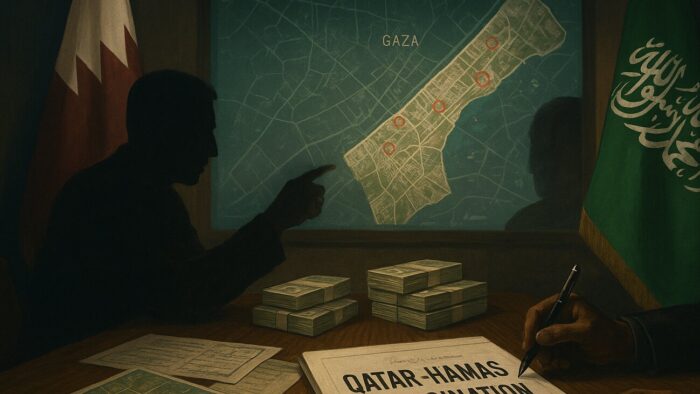A partnership between Qatar’s Media City project and German news agencies has drawn criticism from experts concerned about influence operations. On August 27, 2025, WELT reported that Germany’s main news agency DPA signed a cooperation agreement with Qatar’s “Media City” project in April, with SPD politician Sawsan Chebli reportedly serving as senior advisor while critics warn the initiative serves to improve Qatar’s image and influence global political debates. The article begins:
Peter Kropsch, managing director of Germany’s leading news agency dpa, could not bring himself to smile. Beside him stood a member of the Qatari royal family, on the other side Jassim Mohamed al-Khori, current CEO of “Media City Qatar,” a prestige project of the Gulf monarchy. It was April, and dpa had just signed a cooperation agreement with “Media City,” a mix of office complex and Free Trade Zone for media from around the world. In a statement at the time, it was said that dpa aimed to establish a “regional editorial hub” in Doha. “This partnership strengthens Qatar’s role as a leading media platform and improves news coverage across the entire region.” Perhaps Kropsch already suspected that not everyone would judge the deal benevolently. Critics see “Media City”—where, in addition to dpa, broadcasters like CNN and Euronews are also planning to open offices—as part of a Qatari influence strategy. [Translated from German original using Google.]
Key Points
-
The article highlights Qatar’s strategic pivot from energy wealth to media diplomacy, leveraging partnerships with dpa, CNN, and Euronews to cement Doha as a hub for international journalism and cross-border news production.
-
Observers see the initiative not as a neutral expansion of journalistic capacity, but as a calculated effort to launder Qatar’s global image, manage media narratives, and exert behind-the-scenes influence over political debates in target countries. Critics accuse the country of potentially eroding independent journalism in partner countries and normalizing practices that undermine democratic discourse and press freedom on a global scale.
-
While “Media City” promises an “ethics code” and denies censorship, experts point out that Qatar strictly controls domestic media and employs a dual strategy—allying with reputable international brands while supporting ideologically aligned outlets that amplify state interests abroad.
-
German SPD politician Sawsan Chebli serves as Senior Advisor to the chairman and board of Doha Media City, a role confirmed by her May 2025 appointment to the NGO’s board; her close relationship with Qatar has been evident in recent years through repeated public appearances and affiliations.
How Qatar Deploys Multidimensional Influence
Qatar leverages a unique blend of academic partnerships, media influence operations, and lobbying networks to expand its footprint in the US and globally, with US campuses serving as critical nodes in its soft power apparatus. The Qatar Foundation has funded US university campuses for decades—including Georgetown, Texas A&M, Northwestern, and Cornell—channeling over $6 billion into American higher education, raising concerns about curricular influence and academic autonomy. These investments, while officially framed as cultural and academic exchange, have sparked debate over the potential for foreign policy priorities to shape research agendas and campus culture, especially on Middle East and Islam-related topics.
Parallel to its academic engagement, FARA filings reveal that since the 2024 US election, Qatari agents have shifted focus from general media outreach to a deliberate campaign targeting conservative and right-wing outlets such as Fox News, the New York Post, and the Washington Examiner, with story placements, paid interviews, and consulting deals designed to shape narratives favorable to Doha, while lobbying networks extend into elite political circles, including the recruitment of PR firms run by former US officials and bribing of US Senators.
In Europe, Qatar’s influence operations have attempted to sway parliamentary debates and media coverage, often targeting Qatar’s regional rivals. Together, these efforts form a multi-track strategy: direct academic engagement builds long-term institutional relationships and access to future elites; media operations shape public opinion and political discourse; and elite lobbying secures access to decision-makers.
While Qatar and its partners emphasize transparency and mutual benefit, critics argue that these activities risk ideological capture, diminished academic freedom, and the erosion of democratic institutions—with US campuses and media increasingly viewed as arenas for geopolitical competition.
External References:
-
Follow the Money: Qatar and the Muslim Brotherhood Funding of US Academia (ISGAP)
- How Qatar Spent Billions to Gain Influence in the U.S.
Disclaimer:
The Global Influence Operations Report (GIOR) employs AI throughout the posting process, including generating summaries of news items, the introduction, key points, and often the “context” section. We recommend verifying all information before use. Additionally, images are AI-generated and intended solely for illustrative purposes. While they represent the events or individuals discussed, they should not be interpreted as real-world photography.










